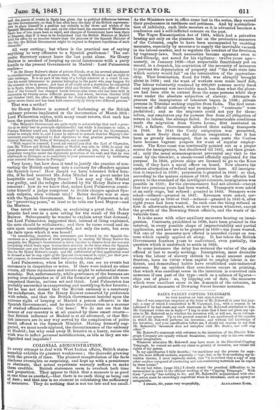COLONIAL ADMINISTRATION.
IN every attempt to deal with West Indian affairs, British states- manship exhibits its greatest weaknesses ; the discredit growing with the growth of time. The plainest recapitulation of the facts discloses oversights so surprising, and kept up with a persistence so obstinate, that actual experience scarcely suffices to make them credible. British statesmen seem to overlook both time and proportion. They appear to think that a measure is as good at one time as another,—that there is no such thing as being out of date ; and that size is no element in calculating the sufficiency of measures. They do nothing that is not too late and too small. As the Ministers now in office come last in the series, they exceed their predecesors in tardiness and pettiness. And by &complica- tion of infelicity, each little measure as it is advanced becomes a confession and a self-inflicted censure on the past. The Negro Emancipation Act of 1834, winch had a privative bearing not only on the planters but on the productive resources of the Colonies, ought to have been accompanied by enabling measures, especially by measures to supply the inevitable vacuum in the labour-market, and to regulate the conduct of the freedmen by vagrancy-laws. Such necessities became apparent even to Lord, Glenelg, not noted for his vigilance : twelve years ago— namely, in January 1836—that respectable functionary put on record, in a despatch, his conviction of the necessity of measures to prevent the depreciation of property and "the rude state into which society would fall" on the termination of the apprentice- ship. That termination, fixed for 1840, was abruptly brought about in 1838; and the want of workers soon made itself felt. The labour voluntarily rendered by 800,000 persons newly freed and very ignorant was inevitably much less than what the plant- ers had been able to extract from the same persons while they were under the absolute subjection of slavery. Attempts to procure the immigration of labourers began in 1838; private persons in Trinidad seeking supplies from India. The first inter- vention of official authority was to impede : "contracts" were prohibited ; and as the migrants could not pay for them- selves, nor employers pay for persons free from all obligation of return in labour, the attempt failed. So impracticable conditions made the migration from Sierra Leone, first instituted in 1841, a failure. Government allowed three sailing transports in 1843. In 1844 the Cooly emigration was permitted, much more freely than the African emigration ; but it has been so grossly mismanaged, that in some parts the Coolies have become vagrant paupers for want of regular employ- ment. The Kroo coast was continually pointed out as a proper source for immigration, but disallowed till 1847, and then grant- ed; only the usual mismanagement prevented anyi visit to the coast by the Growler, a steam-vessel officially appointed for the purpose. In 1848, private ships are licensed to go to the Kroo coast, if they have a naval officer on board. Now observe the curious alternation of refusal and permission here. All immigra- tion is impeded in 1838; permission is granted in 1840: so that, according to the mature opinion of 1840, when the officials had grown to the standard of the intelligent colonists, immigration was possible in 1838; for the circumstances had not altered—except that two precious years had been wasted. Transports were asked at an early stage, but refused : granted in 1843. Steamers were asked—refused—granted in 1847. Kroomen were asked, cer- tainly as early as 1840 or 1841—refused—granted in 1847-8, after eight years had been wasted. In each case the thing refused at first is afterwards granted, with no new reason whatever, except the growth of the Downing Street officials, and the waste of in- valuable time.
It is the same with other auxiliary measures bearing on immi- gration. Contracts, prohibited in 1838, have been granted in the interval, in every possible shape of impracticability and partial application, and now are to be granted in 1848—ten years wasted. Not one of the measures now offered is accorded except on res- sons which equally applied all along. It has taken the British Government fourteen years to understand, even partially, the question which it undertook to settle in 1834.
In some instances the delay has reduced the value of the aids offered at last to nearly nothing. Immigration most desirable when the labour of slavery shrunk to a small amount under freedom, loses its virtue when capital to employ labour is de- ficient, and demoralized habits have established anti-industrial customs. By an accident that sometimes occurs in printing, that which was excellent sense in the intention is converted into nonsense if one part of the type—such as a column of figures— slips out of place : so, by slipping out of date, the measures which were excellent sense in the demands of the colonists, in the practical measures of Downing Street become nonsense.


























 Previous page
Previous page